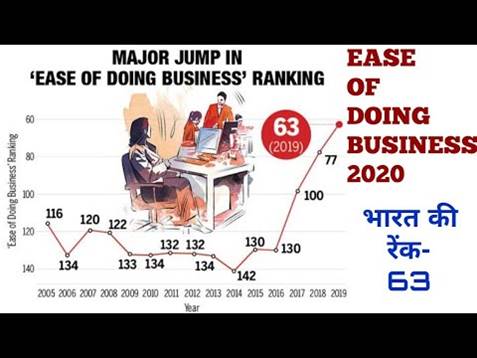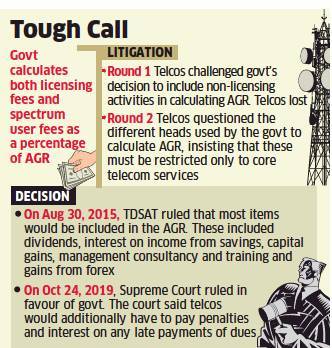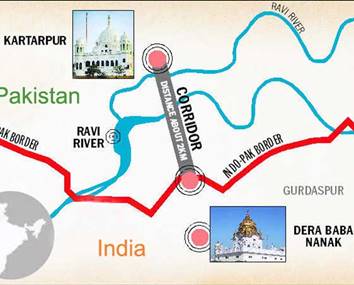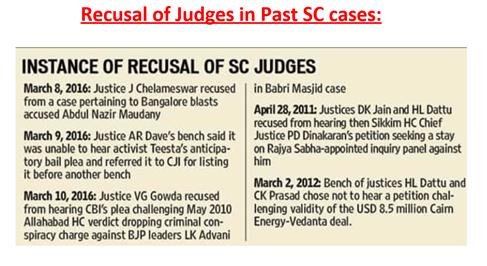



Explained: What helped India go to 63rd spot in ease of doing business?
India has improved its score in the World Bank’s global “Ease of Doing Business” rankings, rising 14 notches to be placed 63rd out of 190 countries on the back of “sustained business reforms”.
India, along with other top improvers, implemented a total of 59 regulatory reforms in 2018-19, accounting for a fifth of all reforms recorded worldwide.
- India made the process of obtaining a building permit more efficient.
- Obtaining all permits and authorizations to build a warehouse now costs 4% of the warehouse value, down from 5.7% the previous year.
- Authorities enhanced building quality control in Delhi by strengthening professional certification requirements.
- Importing and exporting also became easier for companies with the creation of a single electronic platform for trade stakeholders, upgrades to port infrastructure and improvements to electronic submission of documents.

- India saw the biggest jump in ranking in “resolving insolvency" category, to 52nd rank from 108th, on the back of implementation of the Insolvency and Bankruptcy Code.
- Its ranking improved substantially in Dealing with Construction Permits (to 27th from 52nd) and “Trading across Borders" (to 68th from 80th).
- India’s ranking deteriorated on two parameters -- “protecting minority investors" (from 7th to 13th position) and “getting electricity" (from 22nd to 25th) -- and remained unchanged in “enforcing contracts" at 163rd.
- India has made it easier to start a business in the country.
- It has further streamlined the process, reduced the time, cost of obtaining construction permits, and improved building quality control by strengthening professional certification requirements.
- Mumbai’s streamlined obtaining building permits and construction permit.
- Efforts to ease trade across borders and resolve insolvency have also helped improve ranking.
- The government’s goal was to be among the top 50 economies by 2020.
- The country still lags in areas like enforcing contracts and registering property.
- It takes 58 days and costs on average 7.8 per cent of a property’s value to register it, longer and at greater cost than among OECD high-income economies.
- It takes 1,445 days for a company to resolve a commercial dispute through a local first-instance court, almost three times the average time in OECD high-income economies
- This report was introduced in 2003 to provide an assessment of objective measures of business regulations and their enforcement across 190 economies on ten parameters affecting a business through its life cycle.
- 10 parameters used for ranking are- starting a business, construction permits, getting electricity, getting credit, paying taxes, trade across borders, enforcing contracts, and resolving insolvency.
- It ranks countries on the basis of Distance to Frontier (DTF), a score that shows the gap of an economy to the global best practice. For example, a score of 75 means an economy was 25 percentage points away from the frontier constructed from the best performances across all economies and across time.
- Other reports published by World Bank:
- World Development Report
- Global Economic Prospects Report
- Human Capital Index
Supreme Court upheld Department of Telecommunications’ (DoT) definition of adjusted gross revenue (AGR), a contentious point among India’s telecom players and a source of battle running between the government and industry for years.
- Telecom operators are required to pay licence fee and spectrum charges in the form of ‘revenue share’ to the Centre.
- Revenue amount used to calculate this revenue share is termed as the AGR.
- According to the DoT, the calculations should incorporate all revenues earned by a telecom company – including from non-telecom sources such as deposit interests and sale of assets.
- The companies, however, have been of the view that AGR should comprise the revenues generated from telecom services only and non-telecom revenues should be kept out of it.
- The slugfest between DoT and the telecom companies has been on since 2005, when the Cellular Operators Association of India — the lobby group for players such as Airtel and Vodafone Idea — challenged the DoT’s definition for AGR calculation.
- In 2015, TDSAT ruled that AGR includes all receipts, except capital receipts and revenue from non-core sources such as rent, profit on the sale of fixed assets, dividend, interest and miscellaneous income, etc.
- The Comptroller and Auditor General of India (CAG), in a recent report, blamed the telecom companies for “understating revenues” to the tune of Rs 61,064.5 crores.
- The latest petition by the DoT was being heard in the Supreme Court, wherein the DoT sought interest, penalty and interest on penalty on the outstanding amount.
- In recently delivered verdict, court effectively upheld the definition of AGR calculation as stipulated by the DoT.

Amid strained ties between India and Pakistan over Jammu and Kashmir, New Delhi and Islamabad finally signed the ‘Kartarpur Sahib Corridor Agreement’ on the zero line at Dera Baba Nanak in Gurdaspur to facilitate the visit of Indian pilgrims to Gurdwara Darbar Sahib Kartarpur.
- The agreement is significant since it’s essentially a confidence-building measure that comes at a time when the two countries haven’t held bilateral talks amid a series of incidents: terrorist attacks in Pathankot, Uri and Pulwama, Balakot air strikes, downgrading of diplomatic ties, withdrawal of Most Favoured Nation status, snapping of trade ties, and cancelling of bus, train and even postal services.
- This agreement has been signed for five years and can be extended or terminated with notice of one month.
- Kartarpur Sahib Gurdwara is the resting place of Guru Nanak Dev and one of most sacred of Sikh religious sites due to its historical value.
- Indian pilgrims of all faiths and persons of Indian origin can use this corridor.
- While a Pakistani visa will not be required, pilgrims will have to carry valid passports. Persons of Indian origin will need to carry OCI cards with passports of their country.
- Corridor will be remained opened from dawn to dusk, and pilgrims travelling in the morning will have to return the same day.
- It will be operational through the year, except on notified days.
- Pilgrims can visit as individuals or in groups, travel on foot.
- India will send the list of pilgrims to Pakistan 10 days ahead of their travel dates. Confirmation will be sent to pilgrims four days earlier.

- The main point of discussion is Pakistan insistence on levying US$ 20 (about Rs 1,420) as service charge per pilgrim per visit.
- All-weather connectivity
- It is expected that Pakistan will fulfil the assurance that it would build the bridge on their side at the earliest.
- Pakistan has spent about Rs 1,000 crores on the Kartarpur corridor infrastructure.
- It would be providing langar to the pilgrims who visit Gurdwara Darbar Sahib.
- It would also be providing e-rickshaws to ferry the pilgrims from Dera Baba Nanak on the Indian side.
The five-judge Constitution bench hearing a case on the interpretation of a provision of the Land Acquisition Act refused recusal of Justice Arun Mishra from the bench by relying on two judgments delivered by benches headed by former Chief Justice of India (CJI) Dipak Mishra.
- The petitioners (land associations) had sought Justice Mishra’s recusal on the ground that he had delivered the 2018 verdict, which has to be reconsidered, in which the court deviated from the settled law and subsequently sought a larger bench hearing on the issue.

- There may not be even one judge in this court who has not taken a view one way or the other concerning Section 24 of the Act of 2013, either in this court or in the High Court.
- If the submission is accepted, no judge will have the power to decide such a matter on the judicial side.
- Judges recusal is the act of abstaining from participation in an official action such as a legal proceeding due to a conflict of interest of the presiding court official or administrative officer.
- Interest in the subject matter, or relationship with someone who is interested in it.
- Background or experience, such as the judge’s prior work as a lawyer.
- Personal knowledge about the parties or the facts of the case.
- Ex parte communications with lawyers or non-lawyers.
- Rulings, comments or conduct.
- No person should be a judge in her own cause.
- In some cases, prejudice is presumed.
- Free from disabling conflicts of interest
- To dispense justice fairly and fearlessly
- Deliver justice, “without fear or favour, affection or ill-will”.
- It underpins twin pillars of independence and impartiality.

© 2025 iasgyan. All right reserved